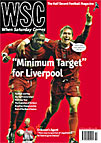 Despite only recently joining England's elite in the Premier League, Birmingham City are a club with big ambitions. Blues supporter Kenneth Jones explains why their rivalry with Villa has been all the more intense recently and why the rapid increase in ticket prices has dissuaded some supporters
Despite only recently joining England's elite in the Premier League, Birmingham City are a club with big ambitions. Blues supporter Kenneth Jones explains why their rivalry with Villa has been all the more intense recently and why the rapid increase in ticket prices has dissuaded some supporters
Could City’s crowds get much bigger than now?
Undoubtedly. City have big local support and, since promotion, more season-ticket holders than Villa. With the team on the up, the only problem might be the mystifying decision to increase standard ticket prices by £10, meaning tickets for games which would have been rapid sell-outs last year have been available on general sale leading up to the match. Any increase in crowd sizes is also constrained by the 30,000 capacity at St Andrew’s, but many would agree there is little point having a brand new £12 million main stand in Division One.